On May 6, 2023, Diana Schmitt and Joe Landl volunteered at the DuPage Veteran Foundation fundraiser to benefit Honor Flight Chicago. 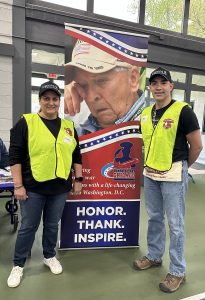

Veteran Spotlight February 2023 – Tom Costello
Name: Tom Costello
Service: United States Marine Corps Reserve 2008-2018
Positions: Data Systems Technician, Data Systems Chief, Maritime Communications Watch Officer
Assignments:
- 2nd Battalion, 24th Marines, 4th Marine Division, Chicago, Illinois
- Headquarters & Service Battalion, Marine Forces Pacific, Camp Smith, Hawaii
I enlisted in the Marine Corps Reserve as soon as I was eligible in high school and left for bootcamp a few weeks after graduation. At the time, there was only one job involving computers available at the Chicago-based unit I was joining. As a life-long computer nerd, I wantedto learn military-grade cybersecurity and knew that position would allow me to do just that.
While many people think of the Armed Forces Reserve as a “one weekend a month, two weeks a year” obligation, it often becomes a much larger commitment. At a high level, being in the reserves versus active duty allowed me to join the Marines whilealso starting college and eventually maintaining a full-time civilian job. At the Chicago-based unit, it was not uncommon for some reserve weekends to be 3-4 days long. As a Data Systems Technician at an infantry battalion, almost everything related to technology was my responsibility.
During these long weekends throughout the Midwest, my main priority was setting up and operationalizing the “Combat Operations Center”, a tent full of computers linked to radios at a remote location. The unit’s leadership relied on this tent full of technology for sharing ground combat plans with hundreds of infantry Marines in the unit, communicating with supply & air support units, and maintaining field medical records. Setting up this center required a wide range of information technology skills.While we always benefitted from the climate controlled tents to keep equipment running (much to the disapproval of our friends in infantry roles), we would definitely feel the proverbial heat from commanding officers if they were unable to use equipment as expected. Despite those stresses, I truly believe I had one of the best roles in the entire USMC Reserve.
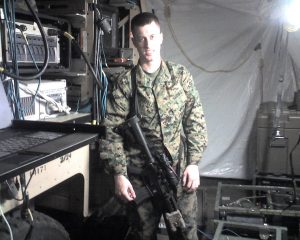
In 2011, around three years into my enlistment, our unit received a VSAT satellite kit that completely changed the unit’s data needs during our training periods. In addition to my “day job” as a full time student completing my bachelor’s degree in computer network technology from Davenport University, I aimed to learn everything I could about satellite computer networking to support the success of the unit. All that hard work paid off in July 2013 during a large training exercise in the middle of the Mojave Desert. By that time, I became the unit’s Data Systems Chief and my small team of reservist data Marines were able to get our satellite dish working before any other unit in the exercise. Although it wasn’t a competition, it also was no small feat in those extreme heat conditions. We ended up visiting many larger reservist units to help fix their satellite network equipment during that trip, which was funny as usually the infantry battalions are the ones receiving assistance from those larger units, not the other way around.
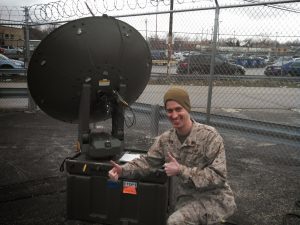
I briefly left that Chicago unit to focus on completing my master’s degree in Information Resource Management from Central Michigan University, but returned in 2015 to join them on a trip to South Korea. Everything went wrong on the satellite network gear while we were overseas, but training with the Republic of Korea Marines was one of the best memories I had in the military. 2016 was very odd as I had to transfer out of the Chicago unit to re-enlist, which led to me join a much larger Hawaii-based unit after getting promoted to Staff Sergeant. I spent most of July 2018 at Pearl Harbor during the Navy’s RIMPAC exercise, serving as one of the Maritime Communications Watch Officers. Our responsibility was to ensure any communications equipment issues during the exercise got resolved quickly, which involved working alongside US Navy, Canadian Navy, New Zealand Navy and Chilean Navy colleagues. The first few days of the exercise were challenging as working an international maritime exercise was completely different than working at an infantry battalion, but it was fascinating to see such a different side of the Marine Corps.
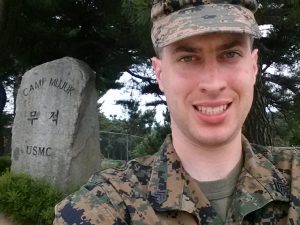
Shortly after that RIMPAC 2018 exercise, I left the military to focus on my civilian career. Every day at Argonne I still use the fundamentals of computer networks learned during my initial USMC Data Systems Technician training nearly 15 years ago. Today, the Marine Corps has a wide variety of roles that involve computers and technology. The days of only one job involving computers at a unit are long gone; there’s even new units that exclusively focus on cybersecurity! I personally benefitted from growing my network security skillset by competing in the National Collegiate Cyberdefense Competition during college and am thrilled to see these types of competitions sponsored by the DOE and DOD. Here at Argonne, I do my best to pay it forward by supporting the DOE Cyberforce Competition. I love that I can even continue building up my radio knowledge that began in the Marines as a member of the W9ANL Amateur Radio Club.
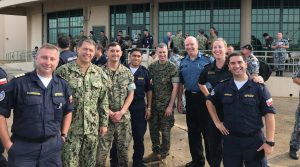
As an 18 year-old at bootcamp and then Marine Corps Communication Electronics School, I had no idea where my military service would take me professionally. I’m happy and proud to have found my professional home at Argonne National Laboratory where the knowledge, skills, and mindsets I developed in the armed forces are valued and celebrated.
Veteran Spotlight January 2023 – Brian Poncin
Name: Brian Poncin
Service: United States Air Force active duty 1995-1999
Position: F-16 Crew Chief
Assignments:
- Lackland AFB, Texas
- Shepard AFB, Texas
- Luke AFB, Arizona
- Edwards AFB, California.
As an F-16 Crew Chief in the U.S. Air Force I was responsible for ensuring over all aircraft care. Duties included overseeing daily maintenance, identifying malfunctions and replacing parts, conducting inspections and maintaining aircraft records, aircraft launch and recovery operations, and general aircraft care.

Most of my four year enlistment was spent at Edwards AFB, California. Edwards is an experimental base and is home to the U.S. Air Force Test Pilot School. In addition to forming lasting relationships with some extraordinary people and performing a very interesting job a couple highlights of my service were as follows: Since, Edwards is a test base it is home to every single aircraft in the Air Force’s inventory. I was fortunate to be able to see all these aircraft up close and personal. I saw everything from old Vietnam era F-4’s and the oldest B-52 in the inventory to the brand new state of the art B-2 and F-22. Such variety made Edwards a very interesting and exciting base to be stationed at. Another highlight to my service was when I was chosen to fly in the back seat of the F-16 that I crewed. This flight was awarded to me right before I finished my four year enlistment. It was a once in a lifetime experience and not something many people get to do. I was able to experience the speed of sound, nine G turns, and I was also allowed to take over the controls and fly the aircraft.
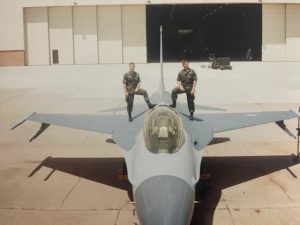
After being honorably discharged in 1999 I went on to use the G.I. Bill to earn my bachelor’s degree from the University of Colorado. I’m proud of my service and it put me on the right track for the future.
I learned many skills in the Air Force that can be applied to my job as a technician here at Argonne National Laboratory. The military taught me how to work with others as a unit in order to accomplish tasks and taught me there is no “I” in team. I learned how to listen to other people’s ideas and implement, question and/or agree for the purpose of success. It also taught me to embrace the diversity found in a team, whether cultural, ethnic, religious, etc. Diversity is where new, out-of-the-box ideas can be found. I also learned that when things don’t go as planned we need to adapt in order to overcome obstacles and find a way to get the job done. Finally, I learned helping others makes a big impact no matter where you are. If you take the opportunity to stop and think of others, it allows you to not only improve yourself but also those around you. It improves your mood and builds character. Maya Angelou once said “At the end of the day people won’t remember what you said or did, they will remember how you made them feel.” 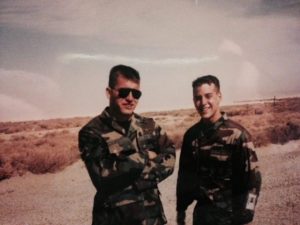
Give credit; Own, and Accept Blame
By: Mike Edelen
My experience in the Navy, which continues to be re-enforced at Argonne, is that people work the best when they know that their leaders support them and will not point the finger at them when something goes wrong. The best leaders I served with in the military would often tell their bosses that their team members were responsible for the success of a mission, project, evolution, etc. although often, the leader’s work, not the team’s work, was the reason the team succeeded.
Similarly, those same leaders would take responsibility for the mistakes made by the team because the team’s performance was a direct result of the training provided by the leader. This type of leadership led me to strive to do my best daily and go above and beyond what was expected of me. The phrase praise in public, correct in private was a common saying in the submarine force as well as other branches of military service and it still holds true.
One of the key tenets of military leadership and Naval leadership is that the leader of the organization is ultimately responsible for their own actions as well as the actions of their team. This is inexplicable to many, in and out of uniform, how can a leader be responsible for something they weren’t there for? Many want to be in charge and take credit when it’s going well, but few people are willing to accept responsibility when things don’t go as planned. As leaders, the sooner we realize and accept that it’s not about the person at the top of the organization, it’s about the team, then we can develop an effective team motivated to do their best, which they will get credit for.
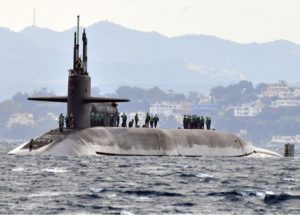
Argonne Employee Group Funds Service Dog for Chicago Area Veteran
Five years of fundraising culminates in donation to cover costs of training Australian shepherd. See article on MyArgonne.



